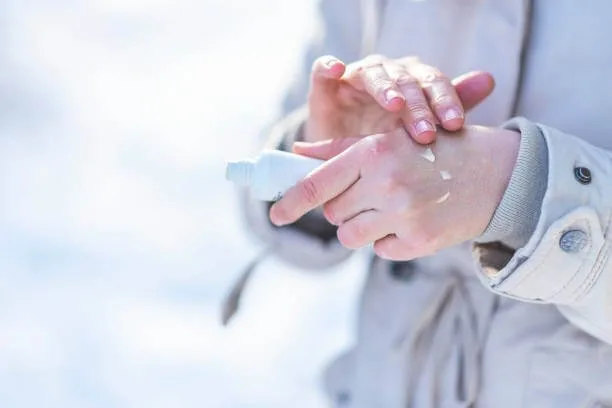When the air is cold and dry, it can make your skin feel itchy, red, and irritated. Fight against dry healthy skin in winter by following these expert tips to maintain your skin’s natural moisture.
Winter can be tough on your skin, with cold outdoor conditions making it red and raw and indoor heat zapping moisture from both the air and your skin. Even enjoyable winter activities like sitting by a fire can contribute to skin dryness. Additionally, hot showers, while comforting, can strip your skin of its natural oils.
The good news is there are several ways to combat the causes of dry skin during winter. Making some simple changes to your daily routine can help you maintain moist and supple skin throughout the season. Check out these 10 easy tips approved by dermatologists for achieving glowing winter skin.
Top 10 Tips for Healthy Winter Skin
1. Invest in a Humidifier to Maximize Moisture

In the colder winter months, the outdoor air is usually drier and colder, holding onto less water,” explains, MD, a dermatologist with Skin Care and Laser Physicians of Beverly Hills in California. To counter this, using a humidifier in your home or office can add moisture to the air, helping to keep your skin hydrated, as advised by the Cleveland Clinic.
Run a humidifier throughout your entire home or in rooms where you spend the most time. Aim to maintain indoor humidity levels between 30 and 50 percent. An option is to run it overnight while you sleep. If you’re uncertain about your home’s humidity levels, you can purchase a humidity meter, such as the well-reviewed.
2. Keep Thermostat Temperatures Cool and Comfortable
If you want to avoid the dry, chilly outdoor air, you might feel like turning up the heat once you’re home. However, the American Osteopathic College of Dermatology (AOCD) points out that high central heat can make the air in your house even drier. To prevent your skin from drying further, try maintaining a cool yet comfortable setting. The AOCD suggests keeping the temperature between 68 to 75 degrees F.
3. Lower Water Temperatures for Showering and Hand-Washing
Taking long, hot showers may seem appealing in cold weather, but according to MD, a dermatologist and founder of Fifth Avenue Aesthetics in New York City, very hot water can dry out the skin. The American Academy of Dermatology (AAD) suggests opting for a 5—to 10-minute warm shower or bath, as it is less likely to worsen dry skin compared to a hot one.
A helpful tip is to avoid water that causes your skin to turn red, as indicated by UPMC. When washing your hands, especially if they tend to be red, scaly, and itchy (potential signs of hand eczema, according to the National Eczema Association), it’s advisable to refrain from using excessively hot water. Exposure to hot water or cold winter air can trigger an eczema flare-up.
The Centers for Disease Control and Prevention (CDC) notes that cooler water is just as effective as warm water at removing germs and is less irritating to the skin.
4. Opt for Gentle, Fragrance-Free Body Cleansers
When you’re taking a bath, bar soap can make dry skin worse by removing the skin’s natural oils and disrupting the micro biome, says Dermatologist.
“For people with dry skin, I suggest using body wash,” recommends Dermatologist. “Choose washes labeled ‘for sensitive skin,’ ‘dye-free,’ and ‘fragrance-free.’ These often have fewer drying ingredients and more moisturizing ones like hyaluronic acid, ceramides, oils, Shea butter, and oats.”
Choose gentle, fragrance-free body cleansers for happy, healthy skin. These cleansers are soft on your skin, avoiding harsh ingredients that might cause irritation. By opting for a gentle, fragrance-free body cleanser, you’re treating your skin with care. It’s a simple yet effective way to keep your skin clean and happy, without any unnecessary fuss or potential skin issues.
Be cautious with “unscented” products, as they might contain chemicals to neutralize scent, potentially causing irritation.
5. Why cleansing your skin matters so much in the healthy skin in winter

Cleaning your skin is super important in the winter because the cold weather can make your skin dry and flaky. When you cleanse your face, you’re not just getting rid of dirt and oil, but also helping your skin stay hydrated. The winter air can be harsh, and cleansing with a moisturizing product adds that much-needed moisture back to your skin. Plus, it prevents breakouts by keeping your pores clear and lets your skin absorb other skincare stuff better. So, by cleaning your face regularly, you’re basically giving it a good chance to stay happy, healthy and looking great even when it’s cold outside.
6. Moisturize Hands Frequently, Especially After Washing
Washing your hands is crucial, especially when the common cold, flu, and COVID-19 are a concern, as noted by the CDC. However, “constant washing will cause the hands to take a beating,” warns Dr. Linda Stein Gold, a board-certified dermatologist at Henry Ford Medical Center in West Bloomfield, Michigan.
After each washing, apply hand cream, Dermatologist suggests. It also recommends wearing waterproof gloves when washing dishes or cleaning around the house to protect your hands.
To help your skin absorb the cream, you can wear cotton gloves after applying moisturizer, according to Dermatologist.
7. Apply Sunscreen — Even on Gray Winter Days
On sunny winter days, the snow reflects the sun’s rays, increasing your exposure to UV rays, warns the Skin Cancer Foundation. UV rays are linked to skin cancer, sunburn, and premature skin aging, including wrinkles and liver spots, according to the American Cancer Society.
Whether you’re skiing, playing in the snow, or running errands in a parking lot, applying sunscreen is just as important in harsh winter weather as it is in the summer.
Even on darker, gloomy days in winter, don’t be fooled. The Skin Cancer Foundation states that up to 80 percent of the sun’s harmful UV rays can penetrate clouds and still cause damage.
Before going outside, apply a broad-spectrum sunscreen with an SPF of 30 or higher, including water resistance and moisturizing ingredients like lanolin or glycerin, to all exposed areas of your body, advises the Skin Cancer Foundation.
8. Wear Appropriate, Comfortable, Nonirritating Clothing

The Skin Cancer Foundation warns that on sunny winter days, snow reflects the sun’s rays, increasing exposure to UV rays. According to the American Cancer Society, UV rays are linked to skin cancer, sunburn, and premature skin ageing, including wrinkles and liver spots.
Whether skiing, playing in the snow, or running errands in a parking lot, applying sunscreen is just as important in harsh winter weather as it is in the summer.
Don’t be fooled, even on darker, gloomy days in winter. The Skin Cancer Foundation states that up to 80 per cent of the sun’s harmful UV rays can penetrate clouds and cause damage.
Before going outside, apply a broad-spectrum sunscreen with an SPF of 30 or higher, including water resistance and moisturizing ingredients like lanolin or glycerin, to all exposed areas of your body.
9. Remember to Eat Right and Stay Hydrated
Don’t expect big changes, but you might be able to moisturize your skin from the inside out slightly. “Staying hydrated by drinking lots of fluids, like water, is one of the best dietary things you can do to prevent dryness,” says Wesley. In a small study, people with low water intake improved their skin hydration by drinking more water, specifically two litres more than their usual daily intake.
Your diet might also play a role. “Avoiding processed foods and sugars and eating whole foods rich in essential vitamins, minerals, and fatty acids will keep the body and skin healthy.
10. Pat Yourself Dry, Then Lock in Moisture
A dermatologist suggests patting your hands dry instead of rubbing them. Blotting or patting the skin dry helps retain more moisture. Patting also helps leave some water on your skin, which is a good thing.
Follow the same approach when drying off after a shower. Blot the skin dry and apply a thick moisturiser within a few minutes after bathing to seal the water into the skin.”

Challenge your winter skin and health
Winter can present challenges for your skin and overall well-being, but adopting some healthy habits can help you thrive during the colder months. Here are some tips to stay healthy in winter:
- Hydrate:
- Protect Your Skin:
- Stay Warm:
Remember, these tips can contribute to your overall health and vitality during the winter season. Always consult with healthcare professionals for personalized advice, especially if you have specific health concerns.
FAQ's
To shield your face from the harsh effects of cold weather, follow these simple steps:
Moisturize: Use a rich, hydrating moisturizer to nourish your skin and protect it from dryness.
Wear a scarf or mask: Covering your face with a scarf or mask can help retain moisture and prevent windburn.
Use sunscreen: Even in cold weather, UV rays can damage your skin. Apply a broad-spectrum sunscreen with SPF 30 or higher.
Stay hydrated: Drink plenty of water to keep your skin hydrated from the inside out.
Avoid hot showers: Hot water can strip your skin of natural oils, so opt for lukewarm water instead.
Use a humidifier: Running a humidifier in your home can add moisture to the air and prevent your skin from drying out.
By following these tips, you can keep your face skin healthy and radiant even in the coldest weather.
It might be because you’re either scrubbing too hard or forgetting to give your skin the moisture it needs. When you skip moisturizer, your skin goes into overdrive, producing more oil to try and hydrate itself. So, don’t forget to show your skin some love with a good moisturizer to keep it feeling happy and healthy!

